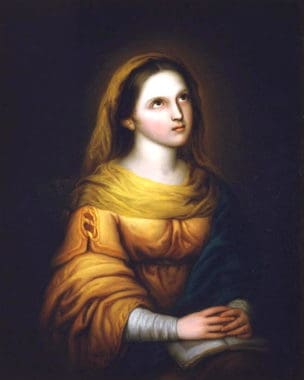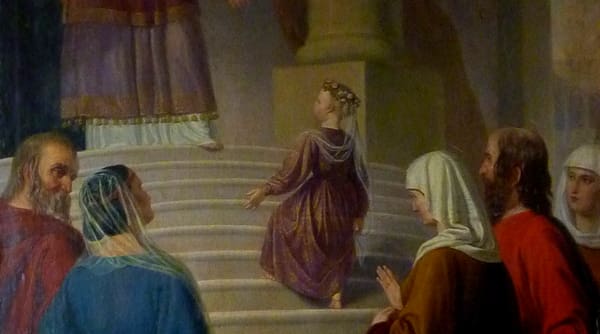The Presentation of the Virgin Mary in the Temple (Part III)

Editor’s Note: This third part of the “Presentation of the Virgin Mary in the Temple” concludes our series for this celebration from the “Glories of Mary” by St. Alphonsus Maria de Liguori, Doctor of the Church. You may read the entire series by clicking here to begin with part one and clicking here to continue reading part two.
***
St. Anselm … speaking of the life of the holy Virgin in the temple, says: “Mary was docile, spoke little, was always composed, never laughed, was never distracted. She persevered in prayer, in the reading of the Holy Scripture, in fasting, and all virtuous works.” St. Jerome goes more into detail, and tells us how Mary’s life was ordered: From early in the morning till nine o’clock she remained in prayer; from nine to three she was engaged in labor; at three she resumed her prayers, until the angel, as usual, brought her food. She was the most constant in vigils, the most exact in obedience to the divine law, the most profound in humility, and the most perfect in every virtue. No one ever saw her angry; all her words were so full of sweetness, that when she spoke it always appeared that God was with her.
The divine mother herself revealed to St. Elizabeth, a Benedictine nun, in the convent of Sconaugia, as we read in St. Bonaventure, that when she was left in the temple by her parents, she resolved on having God alone for father, and often thought what she could do to please him. She determined, moreover, to consecrate to him her virginity, and to possess nothing in the world, giving her entire will to God. She also told her that above all the divine precepts to be observed, she placed before her eyes the precept, “Thou shalt love the Lord thy God!” and that she went in the middle of the night to pray the Lord before the altar of the temple, that he would grant her the grace to observe the commandments, and to see the mother of the Redeemer born while she lived, praying him that he would preserve her eyes to see her, her tongue to praise her, her hands and feet to serve her, and her knees to adore in her arms, his divine Son. St. Elizabeth, on hearing this, said to her: “But, my Lady, were you not full of grace and virtue?”; and Mary answered her: “Know that I esteemed myself the most vile, and unworthy of divine grace; therefore I prayed thus for grace and virtues.” And, finally, that she might persuade us of the absolute necessity we are all under, of asking from God the graces that we need, she added: “Do you think that I obtained grace and virtue without effort? Know that I received no grace from God without great effort, constant prayer, ardent desire, and many tears and penances.”
 But above all, we should consider the revelations made to St. Bridget, of the virtues and exercises practised by the blessed Virgin in her childhood, in these words: “Even from an infant Mary was filled with the Holy Spirit, and as she increased in age, she increased also in grace. Even from that time she resolved to love God with all her heart, so that he should never be offended by her actions or her words, and for this reason all the goods of earth were despised by her. She gave all she could to the poor. In her food, she was so temperate that she only took what was absolutely necessary to support life. Discovering then from the sacred Scriptures, that this God was to be born from a virgin to redeem the world, her spirit was so kindled with divine love that she desired and thought only of God; and taking pleasure only in God, shunned the conversation even of her parents, that they might not hinder her from thinking on God. And more than all did she desire that the coming of the Messiah might be in her day, that she might be the servant to that happy Virgin who merited to be his mother.” …
But above all, we should consider the revelations made to St. Bridget, of the virtues and exercises practised by the blessed Virgin in her childhood, in these words: “Even from an infant Mary was filled with the Holy Spirit, and as she increased in age, she increased also in grace. Even from that time she resolved to love God with all her heart, so that he should never be offended by her actions or her words, and for this reason all the goods of earth were despised by her. She gave all she could to the poor. In her food, she was so temperate that she only took what was absolutely necessary to support life. Discovering then from the sacred Scriptures, that this God was to be born from a virgin to redeem the world, her spirit was so kindled with divine love that she desired and thought only of God; and taking pleasure only in God, shunned the conversation even of her parents, that they might not hinder her from thinking on God. And more than all did she desire that the coming of the Messiah might be in her day, that she might be the servant to that happy Virgin who merited to be his mother.” …
Ah, for love of this exalted child the Redeemer hastened his coming into the world, for whilst she through her humility did not esteem herself worthy of being the servant of the divine mother, she was herself chosen for this mother, and by the odor of her virtues and her powerful prayers, she drew into her virginal womb the divine Son. Hence was Mary called the turtle by her divine spouse: “The voice of the turtle is heard in our land.” [Song of Solomon 2:12 Douay-Rheims (DR)] Not only because she, like the turtle, always loved solitude, living in this world as in a desert, but also because, like the turtle who makes the fields mournful with its sad note, Mary was always mourning in the temple over the miseries of the lost world, and asking from God, the Redeemer of the world. Oh, with how much greater affection and fervor than the prophets did she repeat to God in the temple their supplications and sighs, that he might send the Redeemer, “Send forth, oh Lord, the Lamb, the ruler of the earth” [Isaiah 16:1 DR]. “Drop down dew, ye heavens, from above, and let the clouds rain the just” [Isaiah 45:8 DR]. “Oh, that thou wouldst rend the heavens and wouldst come down” [Isaiah 64:1 DR].
In a word, it was an object of delight to God to see this young Virgin always ascending to a higher perfection, like a pillar of smoke, rich in the odors of all virtues, as the Holy Spirit exactly describes her in the sacred Canticles: “Who is she that goeth up by the desert, as a pillar of smoke of aromatical spices, of myrrh, and frankincense, and of all the powders of the perfumer?” [cf Song of Songs 3:6]. This holy child, says Sophronius, was in truth the garden of delights of the Lord, for he found there flowers of every kind, and all the odors of the virtues. This St. John Chrysostom affirms, that God chose Mary for his mother on earth, because he found not on the earth a more perfect and more holy Virgin than Mary, neither a place more worthy for him to dwell in than her sacred womb. As St. Bernard also says: On the earth there was no more worthy place than the womb of the Virgin. St. Antoninus asserts that the blessed Virgin, in order to be elected and predestined to the dignity of mother of God, must have possessed a perfection so great and consummate, that it should surpass the perfection of all other creatures.
 As then the holy young child Mary, presented and offered herself in the temple promptly and entirely, so let us, at this day, without delay and without reserve, present ourselves to Mary, and entreat her to offer us to God, who will not refuse us when he sees us offered by the hand of her who was the living temple of the Holy Spirit, the delight of her Lord, and the chosen mother of the Eternal Word. And let us place a great hope in this exalted and most gracious Lady, who rewards with so much love the devotions that are offered to her by her servants, as may be seen by the following example:
As then the holy young child Mary, presented and offered herself in the temple promptly and entirely, so let us, at this day, without delay and without reserve, present ourselves to Mary, and entreat her to offer us to God, who will not refuse us when he sees us offered by the hand of her who was the living temple of the Holy Spirit, the delight of her Lord, and the chosen mother of the Eternal Word. And let us place a great hope in this exalted and most gracious Lady, who rewards with so much love the devotions that are offered to her by her servants, as may be seen by the following example:
We read in the life of Sister Domenica of Paradise, written by Father Ignatius of Niente, a Dominican, that in a village called Paradise, near Florence, this little girl was born of poor parents. From her infancy she practised devotion to the divine mother. She fasted every day of the week in her honor, and on Saturday she distributed to the poor the food of which she had deprived herself; and every Saturday she went into the garden, or into the neighboring fields, and there gathered all the flowers she could find, and placed them before a statue of the holy Virgin with the infant Jesus in her arms, which she had in her house. But let us see now with what favors our most grateful Lady compensated this her servant, for the homage she paid her. As she stood one Sunday at the window, when she was about ten years of age, she saw in the street a woman with a beautiful countenance, accompanied by a little child, and they both extended their hands as if to ask alms. She went for some bread, and, behold, before she could open the door, they stood beside her, and she saw wounds on the hands, feet, and breast of the child. Then she said to the woman: “Who has wounded this child?” “It was love,” answered the mother. Domenica, charmed by his beauty and modesty, asked him if his wounds pained him; but he only answered with a smile. As they were standing near the images of Jesus and of Mary, the mother said to Domenica: “Tell me, little girl, what makes you crown these images with flowers?” She answered: “The love I have for Jesus and Mary makes me do it” “And how much do you love them?” “I love them as much as I can.” “And how much can you love them?” “As much as they will help me. “Continue, then,” said the mother, “continue to love them, for they will richly return your love in paradise.” Then the little girl perceived a celestial odor coming forth from those wounds, and she asked the mother with what ointment she had anointed them, and if that ointment could be purchased? “It is purchased,” answered she, “with faith and works.” Domenica then offered them the bread. The mother said: “The food of … my Son is love; tell him that you love Jesus and he will be satisfied.” The child at mention of this word love, began to show great signs of joy, and turning to the little girl, he asked her how much she loved Jesus. She answered that she loved him so much, that day and night she was always thinking of him, and desired nothing else but to please him as much as she could.” “Well,” he answered, “love and love will teach you what you must do to satisfy him.” The odor then increasing which came from those wounds, Domenica exclaimed: “Oh God, this odor makes me die of love; if the odor of a child is so sweet what must be the odor of paradise?” But behold the scene was changed; the mother appeared robed as a queen, and surrounded with light, and the child resplendent as a sun of beauty. He took those flowers and strewed them on her head. She at once saw that these persons were Jesus and Mary, and prostrated herself in adoration before them. And thus ended the vision. Domenica afterwards took the Dominican habit, and died in the year 1553, with the reputation of a saint.
PRAYER
Oh beloved of God! most amiable child Mary! oh, that like thee, who didst present thyself in the temple, and at once and wholly didst consecrate thyself to the glory and love of thy God, I  might offer to thee to-day the first years of my life, and dedicate myself entirely to thy service, oh my most holy and sweet Lady! But it is now too late, for, unhappily, I have lost so many years in serving the world and my caprices, as it were entirely forgetful of thee and of God. Alas for the time in which I did not love thee! But it is better to commence late than not at all. Behold, oh Mary, to-day I present myself to thee, and offer myself entirely to thy service, for the longer or shorter time that remains for me to live on the earth; and with thee I renounce all creatures, and dedicate myself entirely to the love of my Creator. I consecrate to thee, then, oh queen, my mind, that I may always think of the love that thou dost merit, my tongue to praise thee, and my heart to love thee. Accept, oh most holy Virgin, the offering which the most miserable sinner presents to thee; accept it, I pray thee, for the sake of that consolation which filled thy heart when, in the temple, thou gavest thyself to God. And if late I begin to serve thee, it is right that I should make good the time lost by redoubling my devotion and my love. Aid my weakness, oh mother of mercy, with thy powerful intercession, and obtain for me perseverance and strength to be faithful to thee until death; that always serving thee in this life, I may come to praise thee eternally in paradise.
might offer to thee to-day the first years of my life, and dedicate myself entirely to thy service, oh my most holy and sweet Lady! But it is now too late, for, unhappily, I have lost so many years in serving the world and my caprices, as it were entirely forgetful of thee and of God. Alas for the time in which I did not love thee! But it is better to commence late than not at all. Behold, oh Mary, to-day I present myself to thee, and offer myself entirely to thy service, for the longer or shorter time that remains for me to live on the earth; and with thee I renounce all creatures, and dedicate myself entirely to the love of my Creator. I consecrate to thee, then, oh queen, my mind, that I may always think of the love that thou dost merit, my tongue to praise thee, and my heart to love thee. Accept, oh most holy Virgin, the offering which the most miserable sinner presents to thee; accept it, I pray thee, for the sake of that consolation which filled thy heart when, in the temple, thou gavest thyself to God. And if late I begin to serve thee, it is right that I should make good the time lost by redoubling my devotion and my love. Aid my weakness, oh mother of mercy, with thy powerful intercession, and obtain for me perseverance and strength to be faithful to thee until death; that always serving thee in this life, I may come to praise thee eternally in paradise.
+
Art for this post on the Presentation of the Virgin Mary in the Temple: Mariä Tempelgang (Mary at the Temple), Johann Manschgo, undated, photographed by BSonne, 2013-06-16 own work, CCA-SA 3.0 Unported; La Virgen con san Joaquín y Santa Ana (The Virgin with St. Joachim and St. Anne), attributed to Goya, 1774, PD-US author’s life plus 100 years or less; La Virgen en Oración (The Virgin in Prayer), Rosario Weiss Zorrilla, circa 1840, PD-US author’s life plus 100 years or less; Homme en prière (Man praying [Man in Prayer]), Pierre-Louis Delaval, 1826, PD-US author’s life plus 100 years or less; all Wikimedia Commons.




